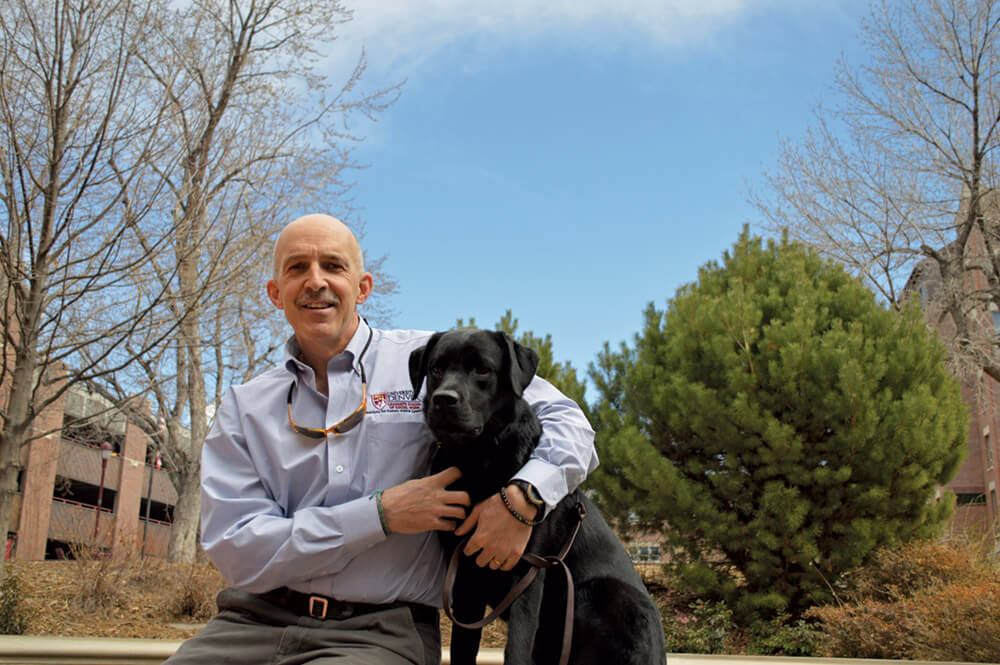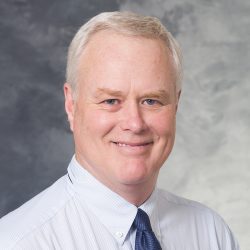Philip Tedeschi ’84, MS’87: Animal Alliances
Every day is Take Your Dog to Work Day for Philip Tedeschi ’84, MS’87. And you couldn’t find a better-tempered, sweeter-eyed dog than Samara, Tedeschi’s black lab — which is only to be expected from the poster dog of a cutting-edge, animal-assisted therapy program.
Tedeschi is the executive director of the Institute for Human-Animal Connection (IHAC) at the University of Denver, which he co-founded in 2005. Housed within the university’s School of Social Work, the institute offers an animal-assisted social-work certificate to students in the master’s degree program, and distance learners can earn an animals-and-human-health certificate.
It all started at the UW. As a student in the veterinary program, Tedeschi moonlighted teaching horseback riding to adults with schizophrenia. The positive changes he saw in the riders left him fascinated with human-animal interactions. His advisers suggested that he leave the vet school to design his own major. Citing Aldo Leopold as a major influence, Tedeschi says he drew from psychology, educational psychology, social work, occupational therapy, physical and recreational therapies, and companion-animal and equine sciences to create his independent major. He stayed on at the UW and completed his master’s in social work in 1987.
While several veterinary schools have related programs, IHAC’s approach of looking at animal-human interactions through the lens of social science is very new, says Tedeschi, and the response has been overwhelming. Hundreds of the program’s graduates have specialized in animal-assisted therapy, and distance learners have represented every continent except Antarctica.
“Animals are now in human health-care environments across the whole human lifespan,” Tedeschi says. IHAC alumni use animal interventions to help many populations, including survivors of school shootings, children in forensic interviews, self-destructive people in prisons, children with autism, and seniors with depression. “[Our graduates] have opened clinics everywhere from Singapore to Latin America,” he adds.
IHAC is also interested in companion animals and their role in providing an “everyday form of mental health” for millions of people. “That really is a major part of the way people cope with everyday stressors,” he says. “They’re some of the most important relationships we have.”
The institute has formed many national and international alliances. Tedeschi was recently at Walter Reed National Military Medical Center to set up internships with the Warrior Canine Connection project, which uses dogs to help service members with PTSD. Last year, the institute hosted its first international conference on the role of animals in trauma recovery. Tedeschi has advocated for biodiversity protection and animal welfare at the UN. He’s taken many students to East Africa, where he encourages them to examine the correlations among ivory poaching, deep poverty, and terrorism.
“I’ve been [at the institute] nearly twenty years,” Tedeschi says, “and this year will be the most exciting yet.”
Published in the Spring 2015 issue




Comments
Mary Ann Brudos March 5, 2015
i am so proud that I have known Philip since his childhood. He is an inspiration to all that meet him. His work has helped so many people as well as protecting the animal kingdom. God bless his work and all who are working for the future care of man and animals learning to share our wonderful world.